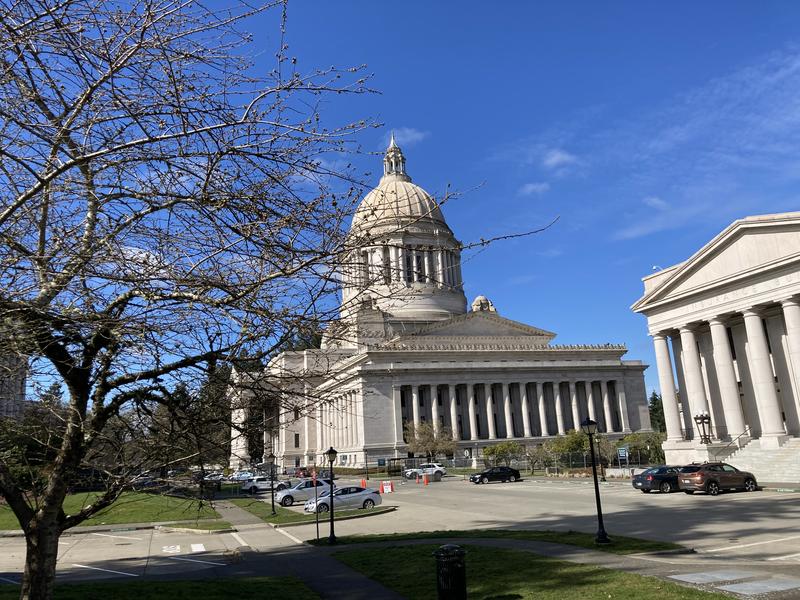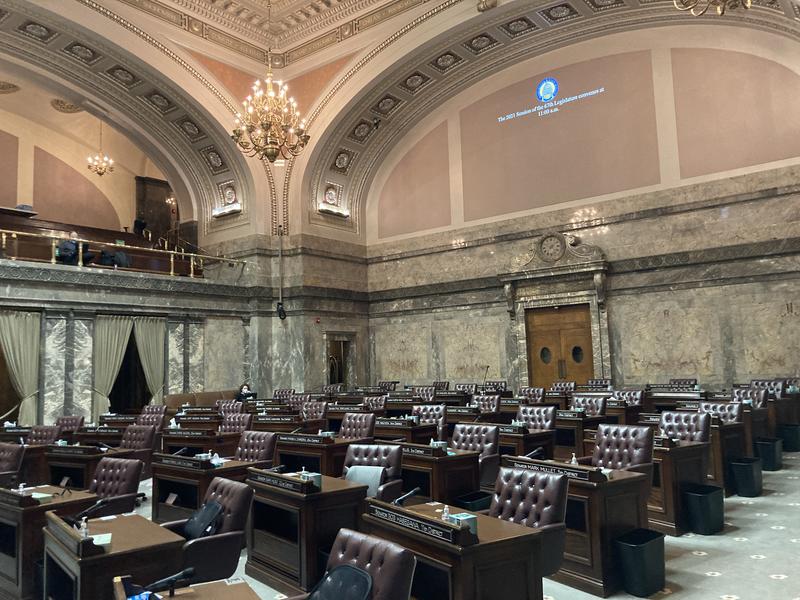
It’s Pedal To The Metal As Washington State Lawmakers Push Ahead With Pandemic-Era Agenda
READ ON
Washington’s 105-day legislative session has crossed the halfway point and a key deadline for policy (non-budget) bills to clear their chamber of origin has passed. Majority Democrats are moving swiftly to enact a pandemic-era agenda focused on issues like tax reform, police accountability, racial equity and global climate change. Minority Republicans, meanwhile, are seeing a few of their bills advance while also objecting to much of what Democrats are pushing forward. So, what’s moving and what’s not? Let’s take a look.
Budget and Taxes
March 17th will bring the next quarterly tax revenue forecast, followed by House and Senate budget proposal unveilings. The forecast lets budget writers know how much the state can expect to collect from taxes over the next four years. After a bleak forecast last June because of COVID, the September and November forecasts were surprisingly favorable. The March forecast is expected to continue that positive trend. That will make it easier for legislative Democrats to fund their priorities while keeping the next two-year budget in balance. One thing to watch for is whether, and to what extent, Democrats still see the need to tap the state’s $1.8 billion budget stabilization account, also known as the “rainy day fund.” Previously, the Legislature approved and Gov. Jay Inslee signed a $2.2 billion COVID relief measure funded with money approved by Congress in December.
Senate Democrats decided not to wait to see what the forecast brings before taking a historic vote on a bill to enact a state capital gains tax. Long the holy grail of progressives, the idea has idled in the Legislature for years (and been championed by Gov. Jay Inslee since 2014). But it never got off the ground. This year, though, was different. You might say it took a global pandemic to get lift off for the capital gains tax. Democrats insist it’s a way to make Washington’s tax code fairer (by taxing rich people) and to address disparities the pandemic threw into stark relief (like gaps in access to affordable child care — more on that below).
Under the version that narrowly passed the Washington Senate (on a vote of 25 to 24), the state would impose a 7 percent tax on gains over $250,000 on the sale of such things as stocks, bonds, personal property and businesses. Real estate, retirement portfolios, timberland and family businesses that gross under $10 million would be exempt. An estimated 16,000 to 18,000 people (individuals and couples) would pay the tax annually. The tax would raise an estimated $500 million a year with the proceeds going to the state’s Education Legacy Trust Account, the general fund and to a new taxpayer relief fund.
While Democrats and their allies cheer the passage of the capital gains tax, Republicans and their allies decry it as an unconstitutional income tax and vow to challenge it in court, and at the ballot.
The capital gains tax bill now goes to the Washington House where it’s likely to get quick consideration and a vote sooner than later.
Child Care
Child care gets its own category here because it’s a major, major focus of majority Democrats this year. Even before the pandemic there was a dearth of child care slots in Washington. And the slots that were available were pricey. (A year of infant care can cost more than a year of college.) Then COVID hit and the industry was pummeled resulting in many providers closing their doors.

The Washington Senate chamber sits empty before the start of the legislative session on January 11, 2021. CREDIT: Austin Jenkins/N3
Now, majority Democrats are calling for hundreds of millions more in state spending to increase child care subsidies (for lower income families) and beef up rates (for providers). Both the House and Senate have passed what Democrats are calling the Fair Start for Kids Act. Senate Democrats approved the Fair Start bill the same day they passed the capital gains tax. It was an intentional pairing as, they say, the proceeds from the new tax would go, in part, to support an expansion of child care. House Democrats have similarly linked the capital gains tax to funding child care. Meanwhile Republicans, who vehemently oppose the capital gains tax, argue the best way to expand access to child care is to reduce regulations on the industry.
Police Accountability
It’s been full speed ahead – since day two of the legislative session – on the issue of police accountability. Spurred by high profile police killings and protests for racial justice, majority Democrats arrived in Olympia in January prepared to consider a slew of bills aimed at changing how police do their work and at holding officers to account for their actions. Of a dozen or more key bills on this topic, at least nine have passed one chamber or the other.
They include:
- A sweeping police tactics bill that would, among other things, ban the use of chokeholds and neck holds, outlaw no-knock warrants and severely curtail when police can engage in hot pursuits. It would also set guidelines on the use of police dogs.
- A sweeping police oversight bill that would, among other things, expand background checks for prospective police officers, expand the list of conduct that can lead to an officer being decertified and create a publicly searchable database of complaints and discipline against officers.
- A requirement that police officers exhaust de-escalation options when possible and only resort to deadly force when necessary to protect against an imminent threat of harm.
- A bill requested by Gov. Inslee to create a state Office of Independent Investigations to investigate police use of deadly force.
The police reforms that haven’t passed include:
- A requirement that cities establish community oversight boards if their police department has 15 or more officers.
- A bill to allow people to sue in state court if they’ve been injured by a police officer and to allow the state attorney general to bring “pattern of practice” actions against police officers and police departments.
- A bill to raise the age and educational requirements for police recruits.
Criminal Justice Reform
Majority Democrats this year say they’re applying an “equity lens” to their work. To that end, a number of bills aimed at addressing racial discrimination and disproportionality in the legal system are advancing.
They include:
Driving While Suspended: A bill that has passed the Washington Senate would end the practice of suspending a person’s driver’s license for failure to pay traffic tickets. It would also reinstate licenses of people that have already been revoked for this reason. Advocates say that low-income people, and in particular people from marginalized communities, get stuck in a vicious, debt-ridden cycle that criminalizes being in poverty: They rack up unpaid moving violations and eventually lose their license, but then continue driving (perhaps because they have to get to work). They are stopped again and are cited for Driving While License Suspended in the third degree. The fines and interest pile up and they can’t get out of the cycle of debt. Sometimes they end up in jail.
Felon Voting: A measure that would have Washington join states like Oregon and California that automatically restore the voting rights of people after they leave prison, even if they haven’t paid off all of their legal financial obligations, has passed the House. The bill is sponsored by newly elected state Rep. Tarra Simmons, a Democrat and attorney who herself spent time in prison.
Three Strikes: In 2019, the Washington Legislature removed the crime of second degree robbery from the list of crimes that constitute a three-strike offense. But the law was prospective not retrospective. As a result, 64 people with second degree robbery convictions are serving life without parole in prison under Washington’s three-strikes law. They are disproportionately Black (46 percent) and 55 or older (45 percent). Under a bill that’s passed the Washington Senate, those 64 individuals would be eligible to be resentenced.
Environment and Energy
Heading into the legislative session, majority Democrats said that addressing the existential threat of global climate change remained a top priority, even as they were forced to reckon with the immediate crisis of COVID-19. To that end, a number of climate-related and environmental bills are progressing through the process.

Refueling a vehicle at a hydrogen gas pump could be a familiar, speedy routine akin to how consumers refuel gasoline-powered cars today. Courtesy of Washington State Senate
Clean Fuels: Perhaps the highest profile bill is Gov. Inslee’s effort, yet again, to get lawmakers to approve a “clean fuels” or “low carbon” fuel standard. Modeled after similar requirements in British Columbia, Oregon and California, this bill would require a reduction in the carbon intensity of transportation fuels (think gasoline and diesel). Specifically, the overall greenhouse gas emissions from transportation fuels would have to drop to 10 percent below 2017 levels by 2028 and 20 percent below 2017 levels by 2035. Inslee and fellow advocates say this policy is needed because the transportation sector is the leading source of greenhouse gas emissions in Washington. Critics say it will unnecessarily drive up the cost of a gallon of fuel. The bill has passed the House.
Environmental Justice: Meanwhile, the Washington Senate has passed what’s known as the Healthy Environment For All (HEAL) Act, which would require several state agencies, including the Department of Ecology, to prioritize environmental justice principles when making decisions and budgeting. For example, before taking major action, agencies would have to conduct an environmental justice assessment to determine the impacts and benefits to “overburdened communities and vulnerable populations.”
Plastic and Foam Waste: As part of an ongoing effort to address plastic and Styrofoam waste, the state Senate has passed a broad bill to implement recommendations from the Department of Ecology. Among its many provisions, the measure would require makers of plastic containers and plastic trash bags to register with the state and report annually on the percentage of recycled materials in their products. Minimum recycled content requirements would also be established. Additionally, starting in 2022, restaurants and fast food joints could only provide plastic utensils, straws, cup lids and packaged condiments upon request. Then, in 2023, the sale of Styrofoam food containers and packing materials would be banned. The sponsor, Democrat Mona Das, says the ultimate goal is to ensure that all packaging is compostable, reusable or recyclable.
Highway Litter: If roadside litter bugs you, then you have something in common with Republican state Sen. Phil “Heck, you could almost furnish a house with what you find” Fortunato. He got a unanimous vote for his “Welcome to Washington Act” to beef up litter control along the state’s highways. The measure requires the state Department of Ecology to prioritize state highway litter control (local roads be damned) when spending its 40 percent share of the state’s litter tax, which is charged to businesses whose products are most likely to end up as roadside trash (think beer, soft drink and cigarette packaging). In addition the bill requires coordination with the Department of Transportation on litter control messaging and with the Washington State Patrol on litter emphasis patrols.
Hydrogen Cars: The Washington Senate has also passed a Republican-sponsored bill to expand an existing tax break for electric cars to include hydrogen fuel cell vehicles. Under the eight-year pilot program, beginning in 2022, new fuel cell vehicles would qualify for a 50 percent discount on the sales and use tax applied to vehicle purchases. Lately, hydrogen has been getting renewed interest as an alternative fuel.
*Cap and Invest: Not yet passed, but still in play is a Senate bill to create what Inslee calls a cap and invest program. It would require the state’s largest emitters of greenhouse gases to either reduce their emissions or purchase offset credits, or allowances, from a newly created state carbon credit market.
Guns
Open Carry Ban: The Washington Senate has approved a bill that would ban the open carry of firearms and other weapons at the state Capitol and within 250 feet of protests and demonstrations anywhere in the state. The bill was prompted by recent acts of violence in Washington and elsewhere, including the deadly insurrection at the U.S. Capitol in January and the shooting deaths of two people at protests in Kenosha, Wisconsin.
Dead Bills
Gun Magazine Limits: A bill requested, not for the first time, by Attorney General Bob Ferguson to ban gun magazines that hold more than 17 rounds of ammunition has died. It did not come up for a vote before the March 9.
Death Penalty: Despite previously passing the Washington Senate three times with bipartisan support, a bill to repeal Washington’s death penalty statute did not come up for a vote this year. In 2018, the Washington Supreme Court ruled the state’s death penalty statute unconstitutional after finding it was “imposed in an arbitrary and racially biased manner.” Therefore, no executions are currently being carried out. Speaker of the House Laurie Jinkins has said the issue can wait until after the pandemic.
Credit Scoring Ban: Insurance Commissioner Mike Kreidler’s effort to ban the use of credit scores to set insurance rates has petered out. Kreider said that credit scoring had a disproportionate impact on people of color and that there were better tools to set rates. But the insurance industry pushed back and the bill was significantly scaled back in a Senate committee. The revised version of the bill would have placed a temporary moratorium on raising rates based on credit history, due to the pandemic. Kreidler wouldn’t support that and the bill didn’t come up for a vote. The sponsor of the bill, Democrat Mona Das says she plans to work on the issue over the legislative interim.
Republican Bills That Died
Asked to highlight some of their bills that died, minority Republicans offered several examples. Here are a few.
A requirement that all schools resume in-person instruction.
The creation of a school voucher program that parents could redeem at the school of their choice.
A requirement that the Legislature sign off on all gubernatorial emergency orders after 30 days.
A bill that would dedicate the sales tax revenues from vehicle sales to transportation projects, instead of the state’s general fund.
A suspension of the state’s eviction moratorium, creation of an emergency rental assistance program and a requirement that tenants owing back rent enter a payment plan or a resolution process.
The legislative session is scheduled to adjourn by Sunday, April 25.
Related Stories:

Washington state bill could change how rural communities could work to close a library
Young adult books at the Columbia County Library. Some people have requested to move the YA section into the adult section because of what they call “obscene” material in 100

Washington leaders try to find solutions for wolf depredations and killing of wolves
A gray wolf. (Credit: William Campbell) Listen (Runtime 1:07) Read Some ranchers are saying it is time to find creative ways to deal with wolf attacks on livestock. That’s what

Washington bill aims to reduce ‘fast fashion’ carbon emissions, pollution
Pollution and greenhouse gas emissions from the manufacture of fast fashion are growing just as fast as the industry. A new bill in Washington aims to help lessen the industry’s















